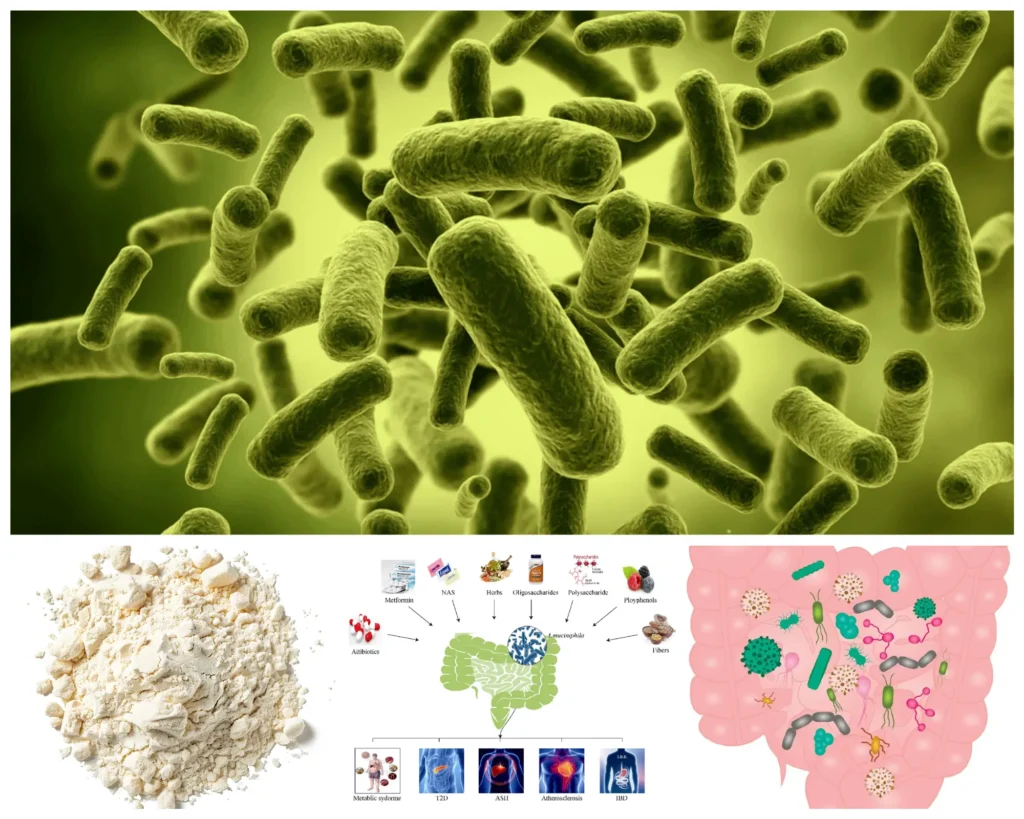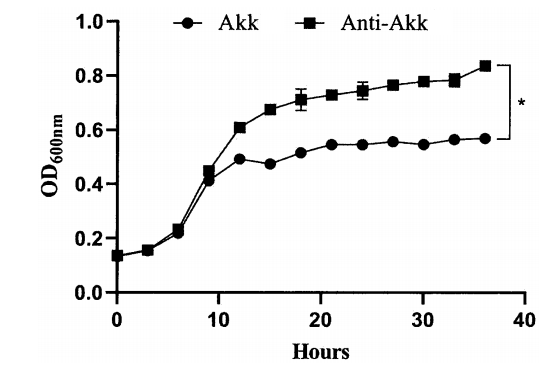Abstract
(1)Benefits of Akkermansia muciniphila
- Improving intestinal function
- Delaying aging
- Improving neurological diseases
- Liver protection effect
(2)Suitable supplemental dosage forms for Akk bacteria
- Tablets
(3)Akkermansia muciniphila Extraction Method
Akkermansia muciniphila is isolated using a composite regulator method that selectively inhibits non-target bacteria, allowing Akk bacteria to flourish. This method employs specific antibiotics to suppress Gram-positive and Gram-negative bacteria while promoting the growth of Akkermansia. The process involves gradient dilution and solid culture techniques to achieve high-purity isolation, facilitating large-scale production and research.
Article Content
Akkermansia muciniphila (Akk bacteria) exists in the human intestine. As a permanent resident of the human intestine, it accounts for 3-5% of the human microbial community. Its standard strain MucT was isolated by Derrien in 2004. It is an oval, Gram-negative anaerobic bacterium and a representative of the Verrucomicrobia. Akk bacteria is a mucin-degrading bacterium that uses mucin as the only source of carbon, nitrogen and energy, that is, it uses mucin secreted by goblet cells located in the intestinal epithelium as "food", thereby promoting the proliferation of intestinal epithelial stem cells and maintaining the integrity of intestinal barrier function. The abundance of Akk bacteria is believed to be negatively correlated with metabolic disorders and inflammatory diseases, including obesity, type II diabetes, inflammatory bowel disease, ALS, epilepsy, autism and atopic responsiveness, etc. It is a highly promising next-generation probiotic.

1. Efficacy of Akkermansia muciniphila
A.Improving intestinal function
It has been found that supplementing Akk in some metabolic diseases can increase the thickness of the intestinal mucus layer, regulate tight junction proteins, and restore intestinal mucosal permeability, thereby improving intestinal barrier function. Studies have found that Akk has an ameliorative effect on a variety of intestinal diseases. The abundance of Akk is significantly reduced in mice with intestinal inflammatory diseases such as IBS, inflammatory bowel disease, appendicitis and allergic diarrhea. The number of Akk is significantly increased after fecal microbiota transplantation, and the symptoms are significantly improved. The most significant feature of IBS is the reduction of endogenous cannabinoid levels in the body. Akk can enhance the host's intestinal immunity and improve IBS by restoring endogenous cannabinoid levels.
B.Delaying aging
A study used progeria mice and healthy centenarians as research subjects and administered Akk bacteria. The results showed that Akk bacteria can significantly prolong the lifespan of progeria mice. In different progeria mouse models, the extension of mouse lifespan exceeded 10%. Moreover, in a cohort of centenarians, compared with healthy adult controls, although the intestinal microbial diversity and abundance of some microorganisms of these centenarians decreased, the level of Akkermansia bacteria in their microbial composition increased.
C.Improving neurological diseases
Studies have shown that Akk can act on the human nervous system and improve a variety of neurological diseases. For example, neurodegenerative diseases are prone to permanent neuronal death and have a variety of negative effects on the health of the body. Studies have found that transplanting Akk into mice with neurodegenerative diseases can significantly improve the condition of mice, reduce the mortality rate of mice and prolong their lifespan. In the HFD-induced Alzheimer's disease mouse model experiment, in addition to the anti-obesity effect, it was also found that Akk can improve the cognitive test level of mice and improve Alzheimer's disease.
D.Liver protection effect
Studies have found that intestinal permeability is damaged, intestinal barrier function is unbalanced, and the abundance of Akk in the body is reduced in mice with fatty liver induced by a high-fat diet. Oral administration of Akk can restore the abundance of intestinal Akk. At the same time, Akk can reduce liver damage, enhance liver immunity, and improve fatty liver by inhibiting IL-6 expression, increasing alanine aminotransferase levels, and restoring intestinal flora diversity. In addition, Akk can also effectively improve liver damage by significantly reducing the levels of diacylglycerol and triglycerides in the liver, inhibiting the secretion of TNF-α and IL-6, and inhibiting the expression of fatty acid synthase-related genes.
2. Regulatory dynamics
In 2022, the European Commission issued Regulation (EU) 2022/168, establishing a list of novel foods in the European Union in accordance with EU Regulation (EC) No 2015/2283 of the European Parliament and of the Council on novel foods, and approving pasteurized strains as novel foods for the EU market. Immediately, pasteurized fermentation culture products appeared on the market. At the same time, research on Akk bacteria for the treatment of diabetes, obesity, non-alcoholic fatty liver disease (NAFLD), irritable bowel syndrome and immunotherapy was also carried out.
3. Market application and product dynamics
Research shows that Akk bacteria have potential functions in a variety of diseases such as cancer, diabetes, obesity, progeria, ALS, IBD, hypertension, autism, etc., and have good application potential in metabolic regulation and immunotherapy. It is a next-generation probiotic and postbiotic precursor strain with broad application prospects.
In the field of supplements, Akk bacteria are usually present in capsules or more complex formulas. The Glucose Control capsules released by Pendulum contain Akkermansia muciniphila. These products are mainly sold in the US and European markets and have attracted attention for their potential health benefits.
In 2023, IFF announced that its French plant successfully achieved industrial-scale production of Akk bacteria, which marked the possibility of large-scale production of Akk bacteria under strict anaerobic conditions. The development of the Akk bacteria market and application in China is relatively slow, but in November 2023, at the 6th China International Import Expo, Tmall Global and Inner Health released the finished Akk bacteria, marking the official entry of Akk bacteria products into the Chinese market. With the advancement of preparation technology and the growth of market demand, the production scale of Akk bacteria is expected to expand further.
4. Current status of production technology
Akk bacteria were originally isolated by the technical team of Wageningen University in the Netherlands. Our technical team isolated 22 strains of Akk bacteria from the southern Chinese population based on their method. Other teams have invented an Akk bacteria-specific screening medium by improving the method of the Dutch team, which can make the positive rate of Akk bacteria screening as high as 70%. All of the above methods first use an enrichment medium containing only purified porcine gastric mucin for enrichment culture, and then select the enrichment culture fluid with the lowest turbidity for separation culture, which involves the preparation and addition of alkaline solution, acidic solution, inorganic salt solution, and purification of mucin. Not only are the experimental steps cumbersome, but there are also some problems such as rare and expensive reagents, which are not conducive to the rapid and accurate screening and separation of Akk bacteria in the laboratory.
Other teams used the vancomycin solid culture medium method to screen and isolate two strains of Akk bacteria from healthy mouse feces. The plate separation method simplified the steps of Akk bacteria screening and separation, but the inventors found that many miscellaneous bacteria grew on the vancomycin solid culture medium during the specific implementation, mainly odor-producing strains, and it was difficult to screen Akk bacteria from these strains. Analysis found that vancomycin can only inhibit Gram-positive bacteria, and has no inhibitory effect on Gram-negative bacteria that are not Akk bacteria. Therefore, finding an antibiotic regulator that can inhibit these Gram-negative bacteria and does not inhibit Akk bacteria has not been reported yet.

5. Introduction to the Scientists’ Technical Achievements
This technology provides a method for the specific screening of Akkermansia muciniphila by using a composite regulator. The composite regulators are regulator A, regulator B, and regulator C. Regulator A is a narrow-spectrum antibiotic that is only effective against Gram-positive bacteria. Regulator B is a broad-spectrum aminoglycoside antibiotic that has an inhibitory effect on Gram-negative bacteria, Staphylococcus aureus, and other Gram-positive bacteria. Regulator C can inhibit Gram-negative and Gram-positive bacteria. The composite regulator method can effectively inhibit the bacteria in fecal samples. Regulator A inhibits Gram-positive bacteria, regulator B inhibits Gram-negative bacteria that regulator A cannot inhibit, and regulator C inhibits both Gram-positive and Gram-negative bacteria. The combined use of the three regulators forms an effective complementary effect, which reduces the difficulty of screening and separating Akk bacteria in fecal samples. In addition, when Akk bacteria are purified and cultured, the use of the three composite regulators can effectively promote the growth of Akk bacteria, which is of great significance for the expansion and in-depth study of Akk bacteria.
The screening and culture method in this technology does not require the use of enrichment culture medium containing mucin for enrichment culture. Instead, the fecal sample can be directly diluted in a gradient manner and then spread on a plate. A typical colony morphology can be formed on the surface of the solid culture medium, which is convenient for selecting colonies for separation and identification. It has the characteristics of rapidity, accuracy, and simple operation, and is suitable for the specific screening of Akk bacteria.
Conclusion
The composite regulator culture medium in this technology can inhibit both Gram-positive and Gram-negative bacteria in fecal samples, and has basically no inhibitory effect on Akk bacteria. It also has a certain growth-promoting effect, allowing it to grow well on the plate surface, reducing the difficulty of screening Akk bacteria in complex mixed samples, and is of great significance for the screening and culture of Akk bacteria.


